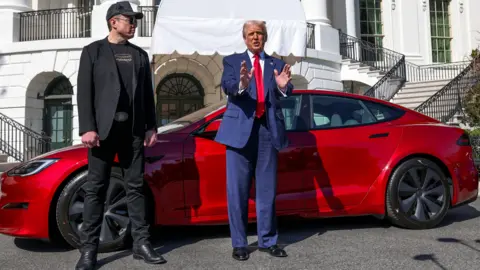Tesla CEO Elon Musk is signaling a considerable reduction in his involvement with the ‘Department of Government Efficiency’ (DOGE), commonly referred to as ‘DOGE,’ as the electric vehicle manufacturer grapples with significant financial challenges and heightened political scrutiny. Recent quarterly results, released on Tuesday, revealed a 20% drop in automotive revenue compared to the same period last year – falling from $21.1 billion to $19.3 billion—and a more than 70% decline in profits. This downturn has been attributed to several factors, including a strategic price reduction campaign aimed at boosting sales, the ongoing impact of tariffs imposed by the Trump administration on Chinese-made components crucial for Tesla’s operations, and ‘changing political sentiment’ that analysts believe is impacting consumer demand.
The company’s warning investors that these challenges could persist underscores a precarious financial situation. Tesla refrained from providing a growth forecast, instead highlighting the potential disruption caused by rapidly evolving trade policies and the broader effects of President Donald Trump’s policies. Musk has publicly clashed with other administration figures, notably trade advisor Peter Navarro, calling him a “moron” over disparaging remarks about Tesla’s manufacturing processes. Navarro had asserted that Musk is primarily a ‘car assembler’ rather than a true car manufacturer.
Adding to the complexity, Musk plans to reduce his time allocation to DOGE significantly starting in May, committing to dedicating only 1-2 days per week to government matters, contingent on presidential requests and their perceived utility. He defended his involvement with the initiative, stating it was ‘critical’ for addressing governmental inefficiencies, but acknowledged that the ‘blowback’ – including protests and boycotts – stemmed from individuals seeking to undermine him and the Doge team. Despite these challenges, Musk believes Tesla is comparatively less vulnerable to tariffs due to its geographically diversified supply chains established in North America, Europe, and China, though he conceded that tariffs remain a persistent obstacle for a company with low margins.
Shares of Tesla experienced significant volatility following the results, initially dropping by nearly 37% throughout the year before rebounding over 5% in after-hours trading. Investment analyst Dan Coatsworth at AJ Bell described expectations as “rock-bottom,” citing Tesla’s reported 13% decline in vehicle sales – the lowest level in three years—and warned of potential risks associated with ongoing global supply chain disruptions related to the Trump administration’s trade war. Looking ahead, Tesla is betting on artificial intelligence for future growth, a strategy that has previously met with investor skepticism. The company’s overall financial performance and strategic shifts are being closely watched as they navigate a challenging economic landscape.

